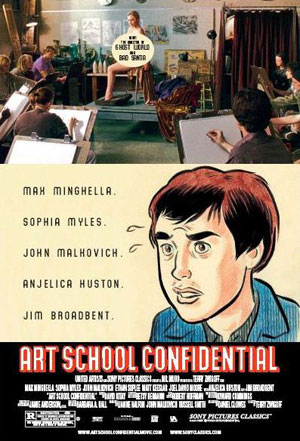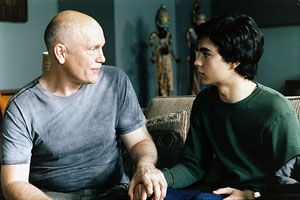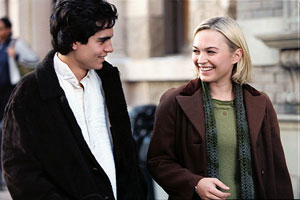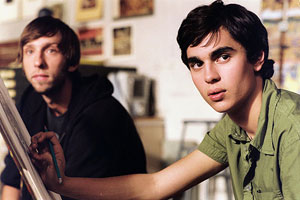 Art School Confidential reunites the Ghost World team of graphic novelist/screenwriter Daniel Clowes and director Terry Zwigoff. This time they’re using a very short piece of Clowes’ as their jumping off point for a film that pokes a lot of fun at art school and art students before turning into a very strange crime film.
Art School Confidential reunites the Ghost World team of graphic novelist/screenwriter Daniel Clowes and director Terry Zwigoff. This time they’re using a very short piece of Clowes’ as their jumping off point for a film that pokes a lot of fun at art school and art students before turning into a very strange crime film.
Max Minghella, son of acclaimed director Anthony, stars as Jerome, a fresh from the burbs kid who wants to be the next Picasso but doesn’t quite fit into the new pretentious world of art school. Minghella’s new to film, but he’s had a busy year – first he starred in Bee Season, where he was the only part of the film I could stomach, and then he played George Clooney’s son in Syriana. Art School is his first real leading role, though, and it places on him the demands of comedy and tragedy. If you think you know what to expect from Ghost World, Art School Confidential will surprise you. It opens this weekend.
Q: What’s your impression of the artist’s rendition of you on the poster?
Minghella: I am pretty into the poster.
Q: Daniel Clowes did the poster.
Minghella: Yeah, Daniel did it. I really like it. It’s actually very similar to an initial drawing he did before we started shooting, before I was cast, of what Jerome would look like, and this is basically the same, it’s bigger eyebrows basically. But I really like it. I think it’s a really cool poster. It’s a difficult movie to sell so it’s kind of got to have the tone right.
Q: How did you end up getting this role?
Minghella: I met Terry in Berkeley, I was shooting a movie there and he lives in San Francisco and so he just happened by our set one day and he just happened to be walking past. And we ended up chatting like very briefly and he said, you know, he was making this movie and I should come and read for him and I said ok. And he came to my hotel room and it was like the middle of the day and I had all the blinds closed and it was like pitch black in my room even though it was two in the afternoon. And I think I won him over instantly and we were fast friends. Then we just hung out and drank and read the script together and he seemed pleased, you know, and that was it. It was a fairly simple audition process.
Q: This was when you were shooting Bee Season?
Minghella: Yeah.
Q: Does your experience with theater training sort of prepare you for playing an art student? Is there a similarity in demeanor?
Minghella: I had very brief theater training. I wouldn’t call it anything more. I went to nothing more than a very brief course, but a good one, very helpful. I had nothing to do with the theater world. There’s a totally different sensibility there.
Q: Do you know a lot of art students that you’ve drawn from?
Minghella: I don’t at all actually. I had about two weeks in between Bee Season and Art School and so I went to a bunch of art galleries and I hung out with an art student for a long time and he stayed with me for most of the shoot. And that helped a lot.
Q: And what did having Daniel there on set do for you?  Minghella: It’s great by all means to have a writer available to you when you have any questions they’re always there. They’re very much a team, Terry and Dan, so it’s great to have as much help as possible.
Minghella: It’s great by all means to have a writer available to you when you have any questions they’re always there. They’re very much a team, Terry and Dan, so it’s great to have as much help as possible.
Q: How are you liking Columbia?
Minghella: Love it.
Q: What are you studying up there?
Minghella: I just started. I’m just doing the core curriculum right now. It’s a bit of everything.
Q: And have you been recognized at all on campus since Syriana?
Minghella: I have no idea. I mean I keep myself to myself so I don’t… I haven’t had any weird interactions.
Q: How do you plan on pursuing your film career and going to school at the same time?
Minghella: A lot of organization, basically. Just logistical stuff more than anything else, but I’m a student primarily. I have to keep a check on that and make sure I get through it hopefully. I don’t want to be, you know, forty-five and still a freshman.
Q: What is Terry’s style as a director?
Minghella: He’s a friend. He’s a great director. He knows exactly what he wants and what he’s doing but he doesn’t feel like working for somebody, I would say. He really feels like your friend from high school is visiting the set today. You know, he just like jokes with you and asks you to like bum cigarettes and like stuff like that, you know. He’s like a kid. He giggles at the monitor like a child. It’s really nice to not be intimidated or nervous.
Q: Did he have references for you that you might not totally understand like obscure comics or books?
Minghella: Yeah, but I’ll tell him “I have absolutely no idea what you’re talking about.” I mean like he’s obsessed with 78s, and old jazz music. Obviously I’m not going to play along, as he’ll find me out.
Q: What do you think this film is saying overall about art and art students?
Minghella: I think it’s a very difficult movie to summarize because it’s got so many themes. But I think the central theme that fascinates me most is the difference in between what you do and who you are, especially in creative mediums where your work is so personal. Where does the line blur in that and where does the line blur in artistic success and what does that mean, and how much of that are you responsible for. I found that all interesting.
Q: Did it change your perception at all of art afterwards?
Minghella: Yeah, I would say it made me think about more things than I would think about normally and you know those things just discussed. What is art? What makes something a piece of art? That’s another question that I’ve never really thought about before. And how easily taste is manipulated; there’s a great scene in the movie, the first time that we all display our work of art and everyone’s looking quietly and doesn’t want to say anything and then John’s like, “Oh yeah, this one’s good.” And then everyone’s like, “Oh yeah, I just want to say that you know I love it because… Blah, blah, blah;” and that’s just what everyone is like. I’m totally like that too. Like, we’re all just kind of like sheep to some degree.
Q: What’s interesting is that in many ways your character is using his art to get the girl.
Minghella: That’s a fact. I think that we all want to find our mate have you know, have the love of our life, and believe in that fantasy to some degree, right. We’ll do whatever, I mean, that’s one of our primary instincts is to procreate, to find the right match for ourselves.
Q: It’s like what art student hasn’t used his art to get girls?
Minghella: Exactly. And what journalist hasn’t used his journalism? And what actor hasn’t used his acting?
Q: Actors, yeah. Journalists, not so much. In the movie Bardo calls Jerome the class douchebag.
douchebag.
Minghella: Yes, I get called a lot of names in this one.
Q: How do you see Jerome amongst his classmates? Do you think he’s the best artist in his class?
Minghella: It’s so subjective. It’s the point of the whole movie . Who’s to say that Jerome’s a better artist, who knows. But I don’t think Jerome’s the class douchebag. I think he’s very confused and very ambitious but I don’t think that he’s a douchebag – he’s just very young.
Q: Does Jerome sell out? Is that what he’s doing?
Minghella: No. I think that it’s worked out nicely. That he can, I think he’s making the best art at the end of the movie, but I think that comes from the fact that he has a validation of success. I certainly feel that like there’s a way when you’re acting where you’re most confident, you are at your best. So it’s kind of like weird, it’s just a vicious circle. I don’t think he’s a sell out but I don’t think he’s going to enjoy he’s gone to the place he wanted to be.
Q: Do you believe in selling out? I mean especially an actor if you were suddenly offered a huge franchise action picture that maybe isn’t up your alley but that you could make a lot of money with, is that selling out or is that doing what you gotta do?
Minghella: I think selling out as I understand it is doing something you don’t believe in. I think that doesn’t have anything to do with what kind of film it is. You know, I love Michael Bay movies; I don’t think I’d be selling out if I did one because I happen to like his movies. If I was offered a Uwe Boll movie, maybe I would be selling out, you know what I mean.. I think if you like something that you can do whatever it is its fine. I think selling out is doing something that you don’t believe in and you’re doing it for a selfish purpose or just to survive. I may well have to sell out one day if I’m living under a cardboard box and drinking myself to sleep every night.
Q: Do you have any artistic talent yourself?
Minghella: I’m terrible at art. Tried but I’m rubbish, sorry.
Q: How many wildly successful artists do you think there are out there who are basically Jonas? Just full of crap, but have achieved that success for one reason or another.
Minghella: Again, it’s a subjective thing. I don’t know what makes somebody an artist so I don’t know how to answer that question. Sorry.
Q: What kinds of things do you do for fun in the city? Do you go to any frat parties at Columbia?  Minghella: So disappointed by the frat community. I mean I’m an English boy going to an American college, and I’m thinking, cheerleaders, I’m thinking kegs, not all was in the cards. Thank God, actually, because I wouldn’t do any work. So a little bit of shock I’d say. I’m pretty reclusive, and I just, I’m a homebody and watch a lot of DVDs and I stay in my room too much.
Minghella: So disappointed by the frat community. I mean I’m an English boy going to an American college, and I’m thinking, cheerleaders, I’m thinking kegs, not all was in the cards. Thank God, actually, because I wouldn’t do any work. So a little bit of shock I’d say. I’m pretty reclusive, and I just, I’m a homebody and watch a lot of DVDs and I stay in my room too much.
I go to Misshapes, I’m friends with those guys, so that’s my one passing indulgence.
Q: Do you dress up for Misshapes? I’ve gone a couple of times, and it’s always filled with people in very wacky outfits.
Minghella: I’m not like into the black hair and the makeup and that.
Q: You just go for the dancing?
Minghella: I’m friends with the guys that do it and they’re total sweethearts, and I also am kind of in love with the girl who is part of Misshapes, she’s amazing and that’s an alluring thing. They just play fun music and everybody has a good time.
Q: So where does your film career go now? Are you just totally dedicated to going to school for the next four years or you know, next summer looking for a script? How are you planning to work your acting out here?
Minghella: I’m shooting a film in Austin but I basically school is my priority right now. And I’m only going to work on anything if I’m desperate to do it. So that’s why I’m here, it’s my focus right now, and I’ll try to make movies basically where I can squeeze it in.
Q: Forgive me if I’m wrong, but the film you’re working on now, does it have a necrophilia aspect?
Minghella: It… sort of does. It does and also it’s like the sweetest most romantic… It’s pathetically sweet, it’s a real straight love story.
Q: Between a guy and a corpse?
Minghella: Well, here’s what happens, Miss Texas dies but doesn’t really die. She comes to my mortician office, embalming office and before I start embalming her I give her a little kiss, and she comes back to life. I did nothing more than give her a little peck and she comes back to life and she wasn’t dead anyway.
Q: What’s the name of the movie?
Minghella: Its called Elvis and Annabelle.
Q: Did your father give you any tips about how to survive in this business?
Minghella: No. I mean, we honestly do like such different things, so very different. I didn’t really realize actually until after I did acting how different acting is in terms of what your day is or what your challenges are, compared to a filmmaker where you’re making your own work. I didn’t think he has that much wisdom to impart.
Q: In your career so far you’ve worked with some really great actors. What kinds of lessons have these guys given you?
Minghella: I think more than anything good behavior. I’ve been incredibly lucky with the people I’ve worked with, they’ve all behaved perfectly and worked incredibly hard. They’re all very serious actors and they don’t fuck around too much. And more than anything that was a great influence and a good energy to be around.
Q: And what is Malkovich like on set? Does he stay in character?
Minghella: No, he’s great. Out of everyone I’ve worked with, technically I’ve learned the most from him because he’s such a veteran. He’s very generous as an actor. Like when he does your off-camera stuff he’ll change what he’s doing to help you and he’s really, really fun to work with. He’s not crazy, everyone thinks Malkovich is crazy eccentric, but he’s a normal dude.
Q: That’s too bad.
Minghella: Yeah, I’m sorry.
Q: Were you a fan of Dan’s books before you got the role?
Minghella: Yeah I was. Yeah, I love Dan’s stuff. He gave me all of his books before we started shooting. I really want to do Death Ray, I think that could be cool.
Q: Did that give you any insight to the script or not at all?
Minghella: Well they have a very particular comic sensibility, Terry and Dan. It’s so like specific. Such a specific kind of humor and you get that hanging around with them because they just end up doing their in jokes all the time. So it really helps just to understand how they enter that world I guess, yeah; its very much Daniel Clowes’ world.
Q: Well there’s obviously something I would guess of Dan in Jerome since this is sort of like Pratt where he went to school. Did you use any of Dan in the performance?
Minghella: I didn’t. My main focus in playing this role was to be as steady as possible. It’s a movie where everybody’s slightly larger than life and it’s got a lot going on and I felt that to make the movie accessible to audiences it needed a center that isn’t too unstable. So that was kind of the main focus. Dan’s like that, I would say, he’s pretty calm and grounded. So I guess subconsciously I tried to use that.